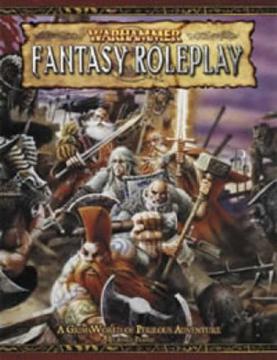This week, I want to take a look an all-time great Dark Fantasy tabletop role-playing game, Warhammer Fantasy Roleplay:
"It is a dark time: far to the north, the gate of chaos has opened once more. Archaon, Lord of End Times, had waged his insane war on the civilized world, although he was beaten back at the last moment, Chaos is still prevalent throughout the land: Beasts ravage the countryside, Mutation and Insanity are rife. Heroes are needed, heroes who will beat back the darkness, heroes the like of which who have better things to do than to save inbred, misbegotten peasants like these.
So, you lot will have to do. May the lords of ruination spare your souls..."
With a very British sense of black humor, Warhammer Fantasy Roleplay is set in the grim and perilous Warhammer Fantasy setting, where the power of Chaos lurks in the heart of every person and simply surviving day-to-day in the midst of various dark and deadly threats is an achievement. First used by the Warhammer Fantasy Battle tabletop miniatures wargame, world of the Warhammer Fantasy drew inspiration from a number of sources, including Tolkien's Middle-earth, RE Howard's Hyborian Age (Conan the Barbarian), Michael Moorcock's Elric, and early modern European history.
Warhammer Fantasy Roleplay is only of the best RPGs in terms of capturing the flavor of Dark Fantasy. Rather than playing (at least in the beginning) badass warriors and powerful wizards, in Warhammer Fantasy Roleplay, the PCs start as everyday scrubs that need to scratch and crawl their way up out of mediocrity, assuming that they don't die in the process. For example, starting PCs include rat catchers and tax collectors. Also, regardless of how powerful the PCs become, they can still be taken out by a lucky shot.
The 2nd Edition did a good job of updating and streamlining the 1st Edition. For example, 2e only uses d10s for resolution. Thus, similar to Call of Cthulhu, Warhammer Fantasy Roleplay uses a roll under percentile system, so task resolution is straightforward.
However, Character Creation and Advancement is quite crunchy in Warhammer Fantasy Roleplay. There are 8 primary attributes AND 8 secondary attributes, as well skills and talents (i.e., perks and disadvantages). This makes creating a PC a lengthy task not easy for a beginner.
Also, as an alternative to leveling, PCs have the ability to shift careers by spending XP. However, there are around 60 basic careers AND 60 advanced careers. That's a lot of careers!
In addition, each career has specific career entries and career exits, so one cannot simply go from rat catcher to noble. This means that players need to crunch out in advance their career paths if they have a specific goal, similar to the feat system in WotC D&D.
So, if you're a roleplaying fan of the Warhammer Fantasy setting, Dark Fantasy, or Horror generally, this may be the tabletop role-playing game for you!



_1st_UK_ed.jpg)